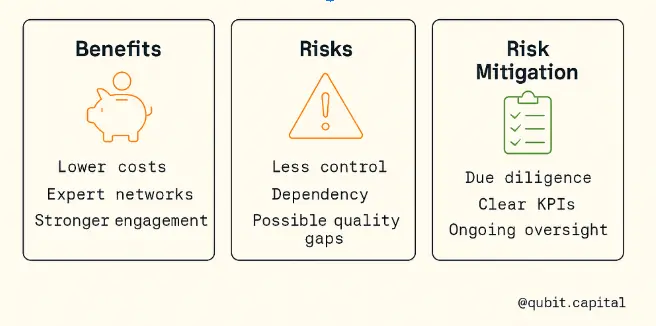Securing funding is often one of the most challenging aspects of building a startup. Outsourced fundraising services have emerged as a game-changer for founders, offering specialized expertise to streamline investor outreach and optimize funding cycles.
Startup survival rates remain concerning. The failure rate for new startups is currently 90%. This underscores just how many founders face overwhelming odds. Understanding this risk gives context for why outsourced fundraising is gaining traction.
Outsourced fundraising means hiring external professionals to manage investor outreach, due diligence, and pitch prep, helping founders save time and leverage expert networks. These services not only save time but also provide access to networks and strategies that might otherwise be out of reach.
A detailed review of fundraising agencies startups illustrates how specialized external partners can align with your startup’s funding needs, enriching your overall capital strategy.
In this blog, we’ll explore how outsourced fundraising can transform your approach to securing capital, highlight key services available, and guide you through selecting the right partner for your startup. Let’s jump right in!
Fundraising Approaches and Industry Insights
Many startups struggle with defining and meeting real market needs. 42% of startups collapse due to misreading market demand. This demonstrates why clear value propositions are not optional but essential for survival.
With countless ventures vying for limited capital, startups must stand out. Achieve this through clear value propositions and robust business models. One effective strategy involves operational outsourcing, which allows startups to focus on their core competencies while delegating non-essential tasks to specialized partners. This approach not only streamlines operations but also ensures that founders can dedicate more time to refining their pitch and building investor relationships.
For example, outsourcing financial modeling or market research can provide startups with high-quality deliverables without overextending their internal resources. Targeted capital-raising strategies are equally critical. Instead of casting a wide net, startups should identify investors whose interests align with their industry and growth stage. This focused approach increases the likelihood of securing funding while fostering long-term partnerships.
Additionally, industry-specific challenges, such as regulatory hurdles or market saturation, require tailored solutions. Startups that address these challenges head-on demonstrate resilience and foresight, qualities that resonate with investors.
A systematic, data-driven approach to fundraising further enhances success rates. By leveraging analytics and market insights, startups can refine their strategies, identify trends, and make informed decisions. This not only boosts credibility but also ensures that every effort is aligned with achieving measurable outcomes.
Fundraising: Data-Driven Insights
The fundraising environment is undergoing a significant transformation, driven by shifting investor priorities and the integration of advanced analytics. U.S. VC funding reached ~$24B in Jan–Feb 2025, up 50%+ year over year, signaling a rebound in deal value even as deal counts slipped. This growth reflects renewed market optimism and evolving expectations from investors. Startups and businesses must adapt by embracing data-driven fundraising insights to remain competitive.
The Role of Data Analytics in Fundraising
Data analytics has become indispensable in shaping modern fundraising strategies. By utilizing tools like AI-enabled due diligence, businesses can streamline investor checks, ensuring faster and more accurate screenings. This automation not only saves time but also enhances decision-making by providing actionable insights derived from vast datasets. For startups looking to refine their approach, exploring AI tools for fundraising offers a deeper understanding of how advanced analytics can complement traditional methods.
Adapting to Investor Priorities
Investor expectations are no longer solely focused on financial returns. Environmental, social, and governance (ESG) factors, along with long-term sustainability, are increasingly influencing funding decisions. To align with these priorities, startups are revisiting their financial models, incorporating metrics that resonate with modern investors. Quantitative data, such as market trends and performance analytics, plays a pivotal role in demonstrating value and potential.
The Value of External Expertise
Outsourcing certain aspects of fundraising can significantly enhance outcomes. By collaborating with specialists, businesses can access tailored solutions that address unique challenges, ensuring a more targeted and effective fundraising process.
As the fundraising landscape continues to evolve, startups must prioritize adaptability and innovation. By integrating data-driven insights and aligning with investor expectations, businesses can position themselves for success in a competitive market.
Successful Fundraising Strategies
Securing funding for your business requires more than just a compelling pitch. It demands a well-thought-out strategy that aligns with your goals and demonstrates your readiness to potential investors. Below, we explore practical steps to implement successful fundraising strategies that can set your business apart.
- Clarify business model
- Prepare investor documentation
- Conduct market research
- Build investor relationships
- Prove operational readiness
1. Establish a Clear Business Model
Investors are drawn to clarity. A well-defined business model not only showcases your revenue streams but also highlights how your product or service addresses market needs. Take the time to refine your value proposition, ensuring it resonates with your target audience. This clarity builds confidence among investors, making it easier for them to see the potential in your venture.
Strategic execution of these steps is crucial for winning investor confidence. Ankar, founded by Palantir veterans, secured $20 million in Series A by modernizing the patent lifecycle. Their readiness and market understanding positioned the company for rapid investor commitment.
2. Prepare Thorough Documentation
Comprehensive documentation is the backbone of any successful fundraising effort. Essential materials include a detailed business plan, financial projections, and a pitch deck that tells your story effectively. These documents should be polished, data-driven, and tailored to the specific audience you’re addressing. A thoughtful discussion around fundraising consultants reveals how personalized advisory support can refine your approach, adding nuance to the fundraising insights presented here.
3. Conduct In-Depth Market Research
Understanding your market is non-negotiable. Investors want to see that you’ve done your homework—this means knowing your competitors, identifying gaps in the market, and demonstrating how your business is uniquely positioned to succeed. Solid market research not only strengthens your pitch but also equips you to answer tough questions with confidence.
4. Build Strong Investor Relationships
Networking is a cornerstone of successful fundraising. Attend industry events, engage with potential investors on platforms like LinkedIn, and seek introductions through mutual connections. Building these relationships early can create a foundation of trust, making it easier to secure funding when the time comes.
5. Demonstrate Operational Readiness
Investors are more likely to back businesses that are ready to scale. This means having the right team, systems, and processes in place to handle growth. Operational readiness signals to investors that their funds will be used effectively, reducing perceived risks.
By focusing on these strategic approaches, you can position your business for fundraising success. Each step builds on the other, creating a cohesive narrative that resonates with investors and sets the stage for long-term growth.
Diversifying Funding Sources
Building a resilient capital structure requires exploring multiple funding channels. A diverse funding mix not only mitigates risks but also ensures sustainable growth. Entrepreneurs can tap into various sources, including angel investors, venture capital, crowdfunding platforms, and strategic partnerships, to create a balanced financial foundation.
The competitive landscape is immense. More than 150 million startups exist worldwide, with 1.14 million in the United States. This abundance emphasizes the need to use diverse funding sources for differentiation.
Angel investors often provide early-stage funding, offering both capital and mentorship. Their involvement can be instrumental in scaling operations during the initial phases. Venture capital firms, on the other hand, focus on high-growth potential businesses, typically investing larger sums in exchange for equity. While this route can accelerate expansion, it may involve significant ownership dilution.
Crowdfunding platforms open access to broader capital bases with minimal equity dilution. By tapping into crowdfunding platforms, startups can diversify funding without relying solely on traditional venture capital. This approach allows businesses to connect directly with supporters who believe in their vision.
Balancing traditional investors with alternative financing options creates a robust funding strategy. Each channel brings unique advantages, enabling businesses to adapt to changing market conditions and scale effectively.
Outsourced Fundraising: Strategic Outsourcing Approaches
Outsourcing fundraising functions has emerged as a game-changer for organizations aiming to optimize resources and accelerate results. By adopting outsourced fundraising solutions, businesses can achieve significant cost savings and reduce the time required to close funding rounds.
Industry case studies highlight cost and timeline benefits of outsourcing. Organizations report up to 50% cost savings and a 30% reduction in time to close funding rounds. For example, one unnamed startup closed its seed round in just three months by outsourcing fundraising.
Role of Fractional CFOs and Outsourced Accounting
This approach extends to financial leadership, where fractional CFOs and outsourced accounting services provide strategic oversight and ensure compliance. These experts help maintain accurate, up-to-date financials that meet investor expectations and regulatory standards. Their involvement can strengthen credibility during due diligence and streamline the fundraising process. Leveraging specialized financial support enables startups to focus on growth while minimizing operational risks.
Outsourcing also allows companies to focus on their core competencies while delegating complex fundraising tasks to specialists. This strategic approach not only minimizes operational burdens but also ensures access to a broader network of investors and tailored fundraising strategies.
For organizations seeking to improve efficiency and achieve faster funding results, outsourced fundraising solutions provide a proven pathway to success.
Top Notable Firms That Assist in Fundraising
1. Qubit Capital
Renowned for its hybrid approach, Qubit Capital pairs proprietary algorithms with hands-on guidance to deliver targeted investor discovery and mapping, personalized outreach at scale, data room preparation, and investment-grade pitch materials. The team goes beyond introductions, helping founders refine narratives, align with investor theses, and navigate diligence with confidence. This bidirectional model also serves investors by curating deal flow that matches sector, stage, and strategic criteria.
2. Magistral Consulting
This full-cycle advisory firm combines deep investor research with managed outreach campaigns, handling everything from shortlist creation to meeting prep and follow-ups. Founders credit its data-driven screening for shortening time-to-term-sheet, especially in AI, fintech, and healthtech verticals.
3. ERB
ERB places fractional CFOs (on-demand, part-time chief financial officers) inside early-stage teams, building audit-ready financial models and running live diligence calls with VCs. Its global bench of ex-Big 4 professionals lets founders access enterprise-grade finance leadership without committing to a full-time hire.
4. AccountX
Specializing in tech startups, AccountX offers package-priced CFO support that bundles cash-flow planning, cap-table management, and investor reporting dashboards. Clients highlight the service as a bridge between seed financing and Series A governance standards.
5. Guberman Group
Guberman layers tax, compliance, and fundraising under one roof, ensuring that investor materials align with U.S. GAAP and regulatory requirements. This end-to-end approach reduces diligence red-flags and accelerates closing timelines for cross-border deals.
6. FundFixr
Using an AI scoring engine, FundFixr automates investor targeting and personalized outreach, ranking prospects by thesis fit, check size, and recent activity. Founders report higher reply rates and a 20–30% cut in manual CRM work thanks to its workflow automations.
7. Pragmatic Coders
Beyond code, Pragmatic Coders delivers story-first pitch-deck overhauls and product-strategy workshops, ensuring the tech narrative resonates with non-technical investors. Engagements typically wrap in three weeks, giving founders polished materials before road-shows begin.
8. Profitzo Invest Tech
Profitzo focuses on India’s early-stage landscape, mapping DPIIT-registered startups (registered with the Department for Promotion of Industry and Internal Trade) to regional angel networks and family offices. Its success-fee model aligns costs with outcomes, keeping cash burn low for sub-₹15 crore rounds.
Benefits of Outsourced Fundraising
The impact of outsourced fundraising is most evident at scale. Over 157,000 startups have been officially recognized by DPIIT as of 2024. Many rely on external partners to streamline fundraising and operations. Outsourcing fundraising functions can transform how businesses manage their capital-raising efforts.
One of the most significant benefits of outsourced fundraising is the ability to streamline operations, allowing internal teams to focus on core business activities. By delegating fundraising tasks to specialized professionals, companies can achieve greater efficiency and faster results.

Enhanced Cost Efficiency
Hiring and maintaining an in-house fundraising team can be expensive, especially for smaller organizations. Outsourcing eliminates the need for full-time salaries, training, and overhead costs, making it a cost-effective alternative. External fundraising experts often bring established networks and tools, reducing the time and resources required to secure funding.
Access to Specialized Expertise
Outsourced fundraising teams come equipped with industry-specific knowledge and experience. Their expertise ensures that fundraising strategies are tailored to align with market trends and investor expectations, increasing the likelihood of success.
Improved Investor Engagement
Professional fundraising partners excel at building and maintaining relationships with investors. Their ability to craft compelling narratives and deliver personalized communication fosters trust and engagement, ultimately driving better outcomes.
By outsourcing, businesses can focus on innovation while external experts handle the complexities of fundraising.
Risks in Outsourced Fundraising
Outsourcing fundraising can offer efficiency, but it comes with its own set of challenges. One significant risk is the loss of control over the fundraising process. When a third party manages donor relationships, organizations may struggle to maintain their voice and values, potentially leading to misaligned messaging.
Another concern is dependency on external expertise. Relying heavily on outsourced teams can leave organizations vulnerable if the partnership ends abruptly or fails to deliver results. Additionally, there’s the possibility of quality concerns, where the outsourced team may not meet the organization’s standards or fully understand its mission.
To mitigate these risks, organizations should conduct thorough due diligence before selecting a partner. Establishing clear contracts, performance metrics, and regular communication ensures accountability. By maintaining oversight and fostering collaboration, organizations can minimize potential pitfalls while benefiting from external support.
Steps to Vet Outsourced Fundraising Partners
- Request detailed references and verify track records with previous clients to confirm credibility and relevant fundraising experience.
- Conduct background checks on key team members to identify any history of misalignment or unethical practices.
- Review all contractual terms, prioritizing fixed fees over equity compensation to maintain control and reduce conflicts of interest.
- Clarify communication protocols and reporting expectations to ensure transparency and ongoing alignment throughout the engagement.
- Assess the partner’s understanding of your business model and fundraising goals during initial discussions for strategic fit.
Conclusion
A well-structured fundraising strategy can transform the trajectory of your startup. Throughout this blog, we’ve explored actionable insights that empower founders to secure investor interest, from crafting compelling pitches to building meaningful relationships. By adopting a comprehensive outsourced fundraising approach, startups can save time, access specialized expertise, and ultimately improve funding outcomes.
We encourage founders to implement these strategies to streamline their fundraising efforts and maximize their potential for success. If you’re ready to elevate your funding journey, discover how our Fundraising Assistance service can provide the support and expertise your startup needs. Let us help you turn your vision into reality.
Key Takeaways
- Outsourced fundraising means hiring specialists to run investor outreach, pitch prep, and diligence support while founders stay focused on building.
- It works best when time is tight, the round is complex, or you need sharper targeting than cold outreach can deliver.
- The biggest upside is speed plus leverage: better investor lists, cleaner messaging, stronger follow-ups, and fewer wasted meetings.
- Cost can improve versus hiring in-house, but only if scope and success metrics are defined from day one.
- Data-driven fundraising wins right now. Investor targeting, traction proof, and clear use-of-funds matter more than hype.
- Diversifying funding sources reduces risk. Blend VCs with angels, grants, strategic partners, and selective alternative routes.
- The main risks are loss of control, misaligned messaging, and dependency on an external team that may not understand your product.
- Vet partners like you are hiring a co-founder. Check references, review track record, confirm team quality, and lock reporting cadence.
- Prefer clear contracts and transparent fees. Avoid messy incentive structures that create conflicts or surprise dilution.
Frequently asked Questions
Which are the top outsourced fundraising firms for startups?
Leading outsourced fundraising firms for startups include Qubit Capital, Magistral Consulting, and FundFixr. These firms offer specialized solutions for capital raising.






